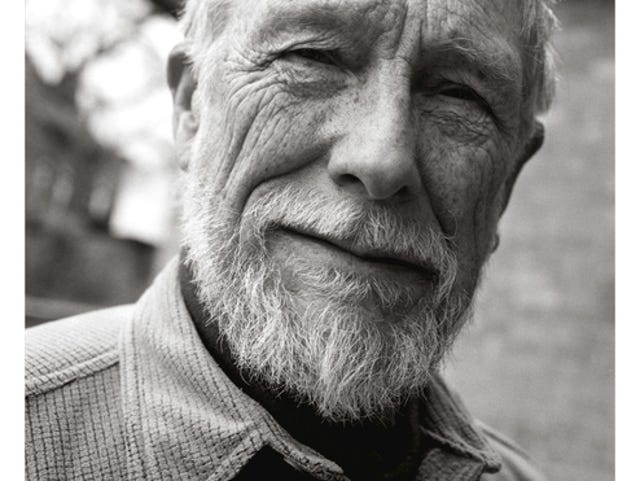cuke page for Gary Snyder
Below is a good bio of Gary from Garrison Keillor's online Daily Almanacthat Brit Pyland just sent. Love the quote from it: The poet Lawrence Ferlinghetti once called Snyder “The Thoreau of the Beat Generation.” I'd say more than of the Beat Generation. I first wanted to say he's our Thorough but no I think he's our Gary Snyder is complete though maybe sounding a little possessive. - dc
It’s the 90th birthday of
the American poet, essayist, and translator who once said, “Poetry
gives you permission to say any kind of language, using any kind of
grammar.” That’s Gary Snyder (books by this author),
born in San Francisco (1930). He is a practicing Buddhist and an
environmental activist. He writes most often about spirituality and the
environment. The poet Lawrence Ferlinghetti once called Snyder “The
Thoreau of the Beat Generation.”
Gary
Snyder grew up in King County, in Western Washington. It was just after
the Great Depression and his family owned farm with dairy cows, hens,
and an orchard, so Snyder worked hard every day. As a teen, his family
moved around a lot, but he found a home in books and fell in love with
D.H. Lawrence. He worked as a camp counselor and a mountaineer for a
time and refers to his early attempts at writing poetry as, “Phase One:
romantic teenage poetry about girls and mountains.”
In
the 1950s, he was captivated by the Beat poets in San Francisco for a
time and became good friends with Jack Kerouac, who would later become
famous for his coming-of-age novel, On the Road (1957). Kerouac
and Snyder lived together in a cabin in Mill Valley, California, for
several months. The character of Japhy Ryder in Kerouac’s book The Dharma Bums (1958) was loosely based on Snyder.
Snyder
wasn’t long for the San Francisco scene, which was quickly turning
hedonistic. He said: “I’ll just say that I am grateful that I came to
meet with peyote, psilocybin, LSD, and other hallucinogens in a
respectful and modest frame of mind. I was suitably impressed by their
powers, I was scared a few times, I learned a whole lot, and I quit when
I was ahead.”
He
sailed for Japan, where he spent the next several years living on a
small volcanic island called Suwanosejima in the East China Sea, along
with several other people. They fished, hunted for food, and meditated
daily.
Snyder
also began exploring Buddhism. His dharma name is “Chofu,” which means,
“Listen to the Wind.” He ended up spending more than a decade in Japan
studying Buddhism and living in monasteries. Sometimes, because the
monastery had no books, he would leave the monastery for a few months
and rent an apartment nearby, just so he could catch up on reading and
writing poetry. He made ends meet by teaching conversational English and
by taking jobs on oil tankers.
On
what Buddhism has taught him about poetry, he says, “Changing the
filter, wiping noses, going to meetings, picking up around the house,
washing dishes, checking the dip stick, don’t let yourself think these
are distracting you from your more serious pursuits.”
He
said, "As a poet I hold the most archaic values on earth. They go back
to the Neolithic: the fertility of the soil, the magic of animals, the
power-vision in solitude, the terrifying initiation and rebirth, the
love and ecstasy of the dance, the common work of the tribe."
And he said, "True affluence is not needing anything."

